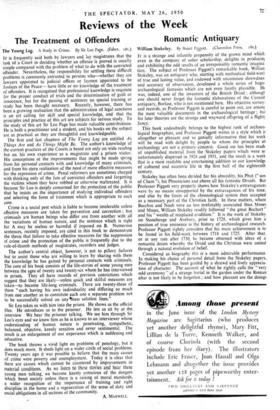Reviews of the Week
The Treatment of Offenders
The Young Lag. A Study in Crime. By Sir Leo Page. (Faber. 18s.) Jr is frequently said both by lawyers and lay magistrates that the task of a Court in deciding whether an offence is proved is usually simple compared with the problem of what to do with the convicted offender. Nevertheless, the responsibility for settling these difficult problems is commonly entrusted to persons who—whether they are lawyers appointed to judicial offices or laymen appointed to be Justices of the Peace— have little or no knowledge of the treatment of offenders. It is recognised that professional knowledge is requisite for the proper conduct of trials and the determination of guilt or innocence, but for the passing of sentences no special training or study has been thought necessary. Recently, however, there has been a growing realisation that the administration of legal sanctions is an art calling for skill and special knowledge, and that the principles and practice of this art are subjects for serious study. To the study of this art Sir Leo Page has made valuable contributions. He is both a practitioner and a student, and his books on the subject are as practical as they are thoughtful and knowledgeable.
The first and last chapters of The Young Lag are entitled As Things Are and As Things Might Be. The author's knowledge of the current practices of the Courts is based not only on wide reading but on his 'own experience as a magistrate and a prison visitor. His conceptions of the improvements that might be made spring from his personal contacts with and knowledge of many criminals, and from his stern realisation of the need of more effective measures for the repression of crime. Penal reformers are sometimes charged with thinking only of the fate of convicted offenders and forgetting the victims whom they have robbed or otherwise maltreated. It is because Sir Leo is deeply concerned for the protection of the public that he insists on the importance of studying individual offenders and selecting the form of treatment which is appropriate to each case.
Crime is a social pest which is liable to become intolerable unless effective measures are taken for prevention and correction ; but criminals are human beings who differ one from another with all the variations of human nature, and the sentence which is right for A may be useless or harmful if imposed on B. Numerous sentences, recently imposed, are cited in this book to demonstrate the thesis that failure to take effective measures for the suppression of crime and the protection of the public is frequently due to the rule-of-thumb methods of magistrates, recorders and judges.
The author's central object, however, is not to pillory failures but to assist those who are willing to learn by sharing with them the knowledge he has gained by personal contacts with criminals. The core of his book consists of the life-stories of some young men between the ages of twenty and twenty-six whop' he has interviewed in prison. They all have records of previous convictions which suggest that they are likely—unless quick and skilful measures are taken—to become life-long criminals. There are twenty-three of them " each having his own individuality and differing so much from one another as to constitute each one a separate problem not to be successfully solved on any mass solution lines."
Sir Leo takes us with him into the prison. He shows us the official files. He introduces us to the prisoner. .He lets us sit by at the interview We hear the prisoner talking. We see him through Sir Leo's eyes and we know him as he is known to an interviewer whose understanding of human nature is penetrating, sympathetic, balanced, objective, keenly sensitive and never sentimental. The result is an enlargement of our experience which is saddening and educative.
The book throws a vivid light on problems of penology, but it does much more. It sheds light on a wider circle of social problems. Twenty years ago it was possible to believe that the main causes of crime were poverty and unemployment. Today it is clear that
there are causes which cannot be countered by improvements in material conditions. As we listen to these stories and hear these young men talking, we become keenly conscious of the dangers which beset society unless there is a raising of moral standards, a wider recognition of the importance of training and right discipline in the home and a regeneration of the sense of duty and social obligations in all sections of the community. A. MAXWELL






































 Previous page
Previous page